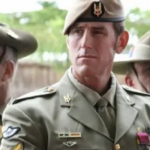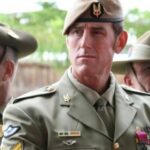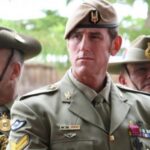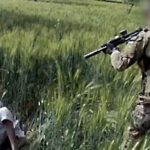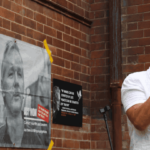The Roberts-Smith Atrocities Lay Bare the Lies of Australia’s Role in Afghanistan
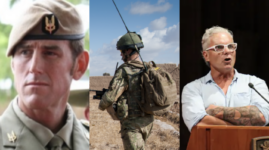
Australians have since been aghast over the outcome of the Ben Roberts-Smith case delivered last Thursday, which saw the Federal Court’s civil division find that that the defendant media companies had discharged their legal onus of proving, on the balance of probabilities, that the war hero murdered four unarmed civilians and prisoners whilst serving in Afghanistan.
Roberts-Smith, who later enjoyed sharing drinks out of a prosthetic leg he’d taken from the body of a disabled Afghan prisoner he’d shot dead, continues to be the most decorated living soldier in this country, having been awarded the rare Victoria Cross, our highest military honour, in January 2011.
Special Air Service Regiment corporal Roberts-Smith, who was deployed to Afghanistan six times between 2006 and 2012, launched a defamation case against three major mastheads in early 2019, for having printed a series of articles that painted him as an abusive war criminal.
Another key reason for the amazement around the ruling is that it favoured public interest journalism, and not the rich and powerful, as this nation’s defamation laws are notorious for doing.
Roberts-Smith has not been found guilty of international war crimes, as that would involve criminal charges being laid and the case determined at a trial, and would be determined according to the higher criminal standard of proof: beyond reasonable doubt. But questions are being asked as to whether this may happen, as his actions have long been scrutinised by the AFP.
Indeed, this man has functioned as a national symbol of Australia’s role in the Afghan war, conveying our attempt to provide peace and stability to the Central Asian peoples of that nation.
Yet, just like Roberts-Smith’s heroism, this assumed Australian liberating mission is a complete myth as well.
Liberating the Afghan people
The war in Afghanistan was Australia’s longest conflict, spanning two decades, which commenced when our nation followed the US in invading that country on 7 October 2001, which was just three weeks after the September 11 attacks on the New York World Trade Centre buildings.
The US was reeling from the terror attacks on its soil. And the Bush administration declared war upon the Central Asian nation in response, as it understood the al-Qaeda masterminds behind the attacks were hiding there, as the terror group had been headquartered in Afghanistan since 1996.
Washington, with Canberra in tow, as it has always been since the 1950s Korean War, invaded Afghanistan, not to liberate the locals from roughly five years of extremely oppressive Taliban rule, but, essentially, to kill al-Qaeda leaders, and, in particular, it’s supreme ruler Osama bin Laden.
For the crimes of their rulers the Taliban, who did have ties with al-Qaeda, the Afghan people were then subjected to twenty years of US and Australian occupation, with tens of thousands of lives lost, including 47,000 civilians.
In fact, of the 19 hijackers found to have perpetrated the 9/11 terror attacks in the United States, 12 of them were from Saudi Arabia and none were from Afghanistan.
Australia pulled its final troops out of the Central Asian country in June 2021, and the US did the same in August that year, which created a power vacuum, leading the way for the Taliban to retake control.
However, the Trump administration had already signed the Doha agreement with the Taliban on 29 February 2020, which guaranteed the US and its allies would withdraw and effectively hand control back to the extremist Islamic organisation, as long as it promised not to let al-Qaeda back in.
Confessions of a true war hero
Former ADF lawyer David McBride served two tours in Afghanistan as a legal officer. And despite strong community support against it occurring, he’s set to stand trial in the ACT Supreme Court in November, over having exposed the fiasco of Australian operations over there to the public.
McBride told Sydney Criminal Lawyers in 2019, that Australia wasn’t “following the law” in Afghanistan, and was running operations in an aimless way, with “everything done for appearance” and with “no intention of actually improving the situation” long-term.
As the whistleblower was ignored when he took his concerns to his ADF superiors, he then provided classified files to the ABC, which exposed numerous Robert-Smith-style war crimes, but McBride’s always maintained he was more concerned about how the entire war effort was being run.
As he explained in 2021, McBride had always been “a true believer” in the US-led allies’ missions in foreign conflicts, until he saw one closeup. And so, concerning were the actions of “western government war machines”, that he now faces the rest of his life in prison for exposing them.
And on release of last week’s Roberts-Smith determination, Greens Senator David Shoebridge said in a statement that it should provide “further impetus, if it was needed, for the attorney general to step in and end the unjust prosecution of Afghanistan war crimes whistleblower David McBride”.
The economic benefits
So, why were Australian and US forces still in Afghanistan twenty years after bin Laden is said to have skipped the country in December 2001, and the Doha agreement and the actions of the Biden administration, simply handed control back to the Taliban, the Afghan people’s initial oppressor?
Well, the US economy has increasingly been based on constant war, as ever-growing amounts are invested in the defence industry, and the only means in which to ensure that the economic growth this provides continues is to find news wars to utilise the weapons it produces to increase demand.
This proposition is supported by the fact that as the US-led invasion of Afghanistan commenced in October 2001, the Taliban made repeated offers to hand over bin Laden if the Bush administration called off its invasion: an offer which the White House duly refused on each occasion.
As for this country’s involvement, Australia has blindly followed Washington into eight foreign theatres of war, commencing with Korea. And the futile operations McBride described as being carried out by our nation not only supported the US military-industrial complex but also our own.
So, Canberra committed to an enduring war in Central Asia primarily to bolster the economy of the US, just as the nation is now readying itself to join Washington in a conflict against China, with the main aim of curbing Beijing’s growing economic power so it doesn’t surpass that of the States.
And as to the immediate reaction Roberts-Smith had to the outcome of the years-long defamation case he brought against major news publications, which found there was substantial evidence that he had committed the war crime of murder on at least four occasions, we’ll never quite know.
The disgraced war hero was arrogant enough to avoid the courtroom on that day, and instead, he was sunning himself on the beaches of Bali.
And one can only hope that Ben wasn’t drinking his beer out of the prosthetic limb of some poor local whom he decided to knock off, as seems to be his habit, so as to have a souvenir yard glass, when he gets together again with the boys back home.


